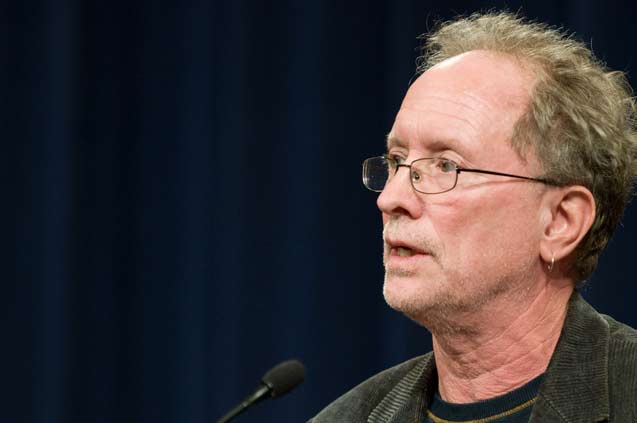Also see: With Teacher Tenure Threatened, Trouble in Every Direction for Public Education
 Bill Ayers. (Photo: Jerome Phillips)
Bill Ayers. (Photo: Jerome Phillips)
If you flip through your yearbook from school, there’s a chance you’ll happen upon a picture of a teacher who was, in your estimation, a lousy educator. We’ve all had bad teachers who failed in some form or fashion to connect with you or the entire class and teach in a way that you truly learned about the subject. However, if you take that same yearbook, you will most likely find far more teachers who were effective educators. If you attended a public school (and some private schools) many of the teachers you had were tenured. That doesn’t mean they couldn’t get fired for ineffective teaching. It means they are afforded due process to explore claims made against them by students, parents, administrators, or interest groups who have a complaint.
Tenure means fair procedures are in place, bound by laws, policies, or agreements that protect teachers from arbitrary reasons for termination. For anyone who has served on a jury or even sat through a court proceeding, you know the process is slow, technical, and guided by laws that frame the case. If you were arrested on an arbitrary charge, the legal system (though flawed, and certainly rife with examples of miscarriages of justice) has protections built in through the 5th and 14th Amendments the Constitution that guarantee due process. If polled, do you think a majority of people would say they want to give up their right to due process? Yet, that’s exactly what people want to see happen if teaching tenure is abolished. Spurred by misinformation, jealousy, or resentment, many people assume that tenure for teachers is tantamount to a lifetime job.
However, tenure for teachers is not designed to insure a lifetime job without any kind of repercussion for ineffective teaching, violations of law, policy, or agreements. Like the kind of due process one gets in the legal system, tenure is about due process; due process that’s built into the contracts between teachers and school districts they work in. If you live in a state that has “at will” employment, it means that you, as an employee, have very few protections against arbitrary termination. If a boss or manager doesn’t like you for whatever reason, they can “let you go” (i.e., fire you). It doesn’t matter if you did a great job for that company or not, or how much you plead your case, if the employer says get lost, you get lost. Of course, “at will” means you can leave a job at a moment’s notice, too. However, “at will” presumes that both the company and the worker have a kind of equal status in the economy, and overlooks other factors like economic conditions, age, gender, and sexual orientation in losing a job. Tenure is a bulwark against the capriciousness of “at will” employment, and is something that unions have fought long and hard to implement and keep as part of their labor contracts.
Now with the recent Los Angeles Superior Court ruling in Vergara v. California that said tenure violated the civil rights of students because of four statutes in the California Education Code (4429.21(b), 44934, 44938(b) (1), 44944, and 44955), that bulwark against the capriciousness of “at will” employment is under threat of erosion. The statutes in the lawsuit center on tenure, seniority, and rules for dismissal, and Superior Court judge Rolf Treu ruled in favor of the plaintiffs — but the legal issues raised in Vergara are far from over.
Educator, activist, and Truthout contributor Bill Ayers discusses tenure, the recent Superior Court decision, and the neoliberal movement to change education in the United States. It’s a movement that stresses testing, training, and tracking of students rather than a more holistic approach that promotes critical and creative thought and lifelong learning – something that even the most ardent neoliberals want for their children.
Join us in defending the truth before it’s too late
The future of independent journalism is uncertain, and the consequences of losing it are too grave to ignore. To ensure Truthout remains safe, strong, and free, we need to raise $43,000 in the next 6 days. Every dollar raised goes directly toward the costs of producing news you can trust.
Please give what you can — because by supporting us with a tax-deductible donation, you’re not just preserving a source of news, you’re helping to safeguard what’s left of our democracy.